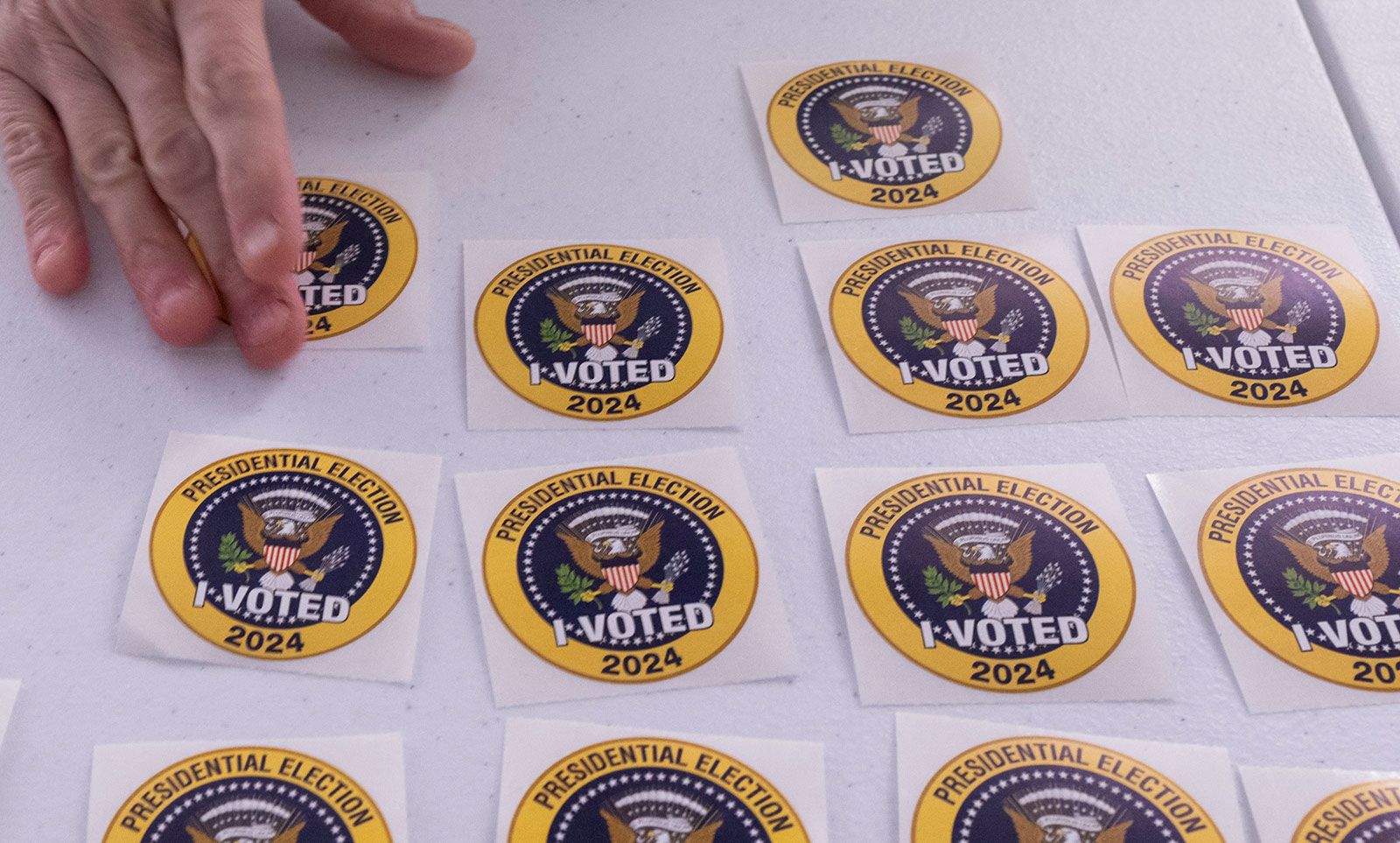Virginia city’s preelection fight over certification shows how local procedures have become a flashpoint

A voter picks up an "I Voted" sticker after casting an early ballot in Arlington
By Rene Marsh and Tierney Sneed, CNN
(CNN) — A lawsuit from two Republican officials in Waynesboro, Virginia, that threatened not to certify the 2024 election results attracted a counter lawsuit Monday from voters in the Shenandoah Valley city who are seeking a court order that would force the board to formalize the results.
The dispute — in which the Republican officials on the Waynesboro Board of Elections are demanding a hand-count of ballots before they certify the 2024 results — is just the latest example of how local certification procedures have become a hot spot for unsubstantiated election fraud claims since former President Donald Trump’s attempts to overturn his 2020 loss.
The Virginia lawsuits stand out, however, for how the local officials are threatening to not formalize the results — potentially gumming up the works for certifying the entire state vote — well before the final ballot has been cast.
The two Republican officials, election board Chair Curtis Lilly and Vice Chair Scott Mares filed their lawsuit on October 4 in the Waynesboro Circuit Court against state elections officials, alleging that the voting machines used in Virginia are unverifiable and could potentially be manipulated.
In response, five Waynesboro voters filed their own lawsuit against the local officials, asking that the Circuit Court step in to protect their rights “under the Virginia constitution to have their votes counted and certified.”
The voters alleged the GOP officials’ lawsuit was an “effort to spread distrust of voting machines, the use of which is expressly permitted by the Virginia Constitution.”
In their initial suit, the Waynesboro officials said there was “no way to ensure that the [voting] machine does not connect to the internet or present results inconsistent with the content of the ballot box.” They claimed in affidavits that, because they could not certify that “votes have been counted and apportioned correctly by voting machines,” they would “refuse to certify the 2024 election until such time as the legal regime permits for hand-counting ballots.”
Lilly and Mares are two of three Waynesboro election board members in a Republican-leaning city where the majority of votes went for Trump in 2020. Waynesboro is about 30 miles west of Charlottesville, Virginia.
The new lawsuit from the Waynesboro voters alleged, citing a news report, that one of the GOP officials got the idea to file a lawsuit from the attorney who is now representing them. That lawyer, Thomas Ranieri, said in a statement Tuesday that his clients “want to ensure that all voters’ votes are safely cast and accurately counted, which is something they cannot verify at the present.”
“This case is not primarily about machines or removing voters; it is primarily about whether my clients can verify an election’s integrity in good conscience and under their oath without making sure that the votes represented on the returns are true and accurate,” Ranieri said in the statement, adding that the officials would submit to what the court decides but that they would appeal any decisions they disagree with.
A spokesperson for the Virginia State Board of Elections did not reply to CNN’s inquiry. The office of state Attorney General Jason Miyares, a Republican, said it does not comment on ongoing litigation.
While the dispute arises from a rural county in a state not seen as a key battleground in the presidential race, it shows how the once unheralded processes of election administration have become flashpoints in the fallout from 2020 election subversion schemes.
During that election, officials in Wayne County, Michigan, briefly balked at certifying the results in that jurisdiction, which includes the heavily Democratic Detroit, amid a relentless campaign by Trump to claim without proof that the election was rife with fraud. The officials eventually formalized the vote count.
“Certifying elections have not been an issue in the past. It has historically been a formality that marks the end of the vote-counting process,” Lauren Miller Karalunas, a senior counsel at the liberal-leaning Brennan Center for Justice at New York University’s law school, told CNN. “But in 2020, that changed when we saw refusals to certify the results after the election. This is an escalation of that, where we are seeing threats of refusal to certify an election even before the election has occurred.”
Elections since have featured similar, albeit less high-profile, local squabbles over certification. The refusal by Republican officials in Cochise County, Arizona, to certify the 2022 midterms by the legal deadline resulted in criminal charges, with one of the two charged officials entering a guilty plea this week in the case and the other set to face trial next month.
Fights over the certification of election results have already become a hallmark of the 2024 contest, with battleground Georgia contending with a growing legal drama over new state election rules that Democrats say could allow local officials to delay or decline altogether certification of this year’s results.
The officials in the key presidential states targeted in Trump’s 2020 gambits have been preparing strategies to head off local-level certification fights.
CNN’s Devan Cole contributed to this report.
The-CNN-Wire
™ & © 2024 Cable News Network, Inc., a Warner Bros. Discovery Company. All rights reserved.
